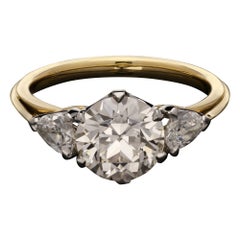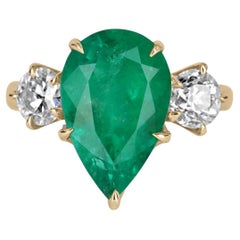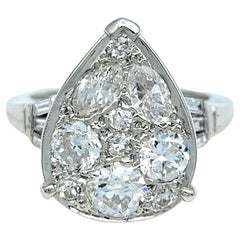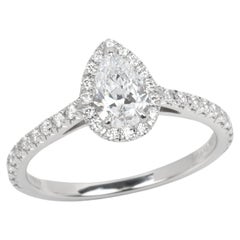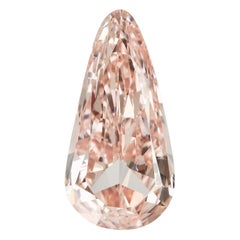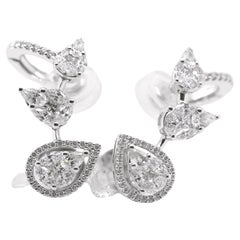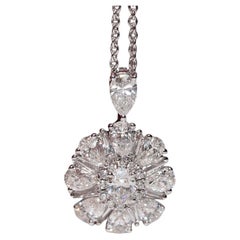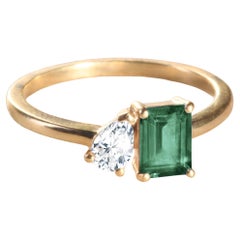European Cut Pear
21st Century and Contemporary Engagement Rings
Diamond, 18k Gold, Platinum
2010s American Three-Stone Rings
Diamond, Emerald, Gold, 18k Gold, Yellow Gold
Early 20th Century Unknown Contemporary Cocktail Rings
Diamond, Gold, 14k Gold, White Gold
21st Century and Contemporary European Engagement Rings
Diamond, Platinum
21st Century and Contemporary European Art Deco Loose Gemstones
Pink Diamond
2010s European Contemporary Lever-Back Earrings
Diamond, 18k Gold, White Gold
Vintage 1980s European Pendant Necklaces
Crystal, 14k Gold, Yellow Gold
Early 2000s European Modern Pendant Necklaces
Diamond, White Gold
2010s European Contemporary Cocktail Rings
Diamond, Tourmaline, 18k Gold, Yellow Gold
2010s European Modern Cluster Rings
Diamond, Rose Gold
21st Century and Contemporary European Contemporary Engagement Rings
Diamond, Tanzanite, 14k Gold, Rose Gold
2010s European Modern Cocktail Rings
Diamond, Emerald, 14k Gold
2010s European Modern Stud Earrings
Diamond, Emerald, Gold, 18k Gold, White Gold
1990s European Retro Cluster Rings
Diamond, Sapphire, 18k Gold
Early 2000s European Modern Cluster Rings
Diamond, 14k Gold
Vintage 1930s Unknown Pendant Necklaces
Diamond, Gold, 9k Gold, White Gold
21st Century and Contemporary European Contemporary Three-Stone Rings
Diamond, 18k Gold, White Gold
21st Century and Contemporary European Contemporary Stud Earrings
White Diamond, White Gold
2010s European Contemporary Chain Necklaces
Diamond, Peridot, 18k Gold, White Gold
1990s European Retro Drop Earrings
Diamond, Emerald, 18k Gold
1990s European Retro Cluster Rings
Diamond, Sapphire, 18k Gold
Vintage 1980s European Retro Cluster Rings
Diamond, Sapphire, 18k Gold
Mid-20th Century Italian Art Nouveau Clip-on Earrings
Blue Sapphire, Sapphire, Ruby, Emerald, White Diamond, Diamond, Sterling...
21st Century and Contemporary European Artisan Cluster Rings
Diamond, 18k Gold, White Gold
2010s European Modern Cluster Rings
Diamond, White Gold
Antique Late 18th Century European Georgian Link Necklaces
Garnet, Gold
Vintage 1910s Pendant Necklaces
Diamond, Platinum
Vintage 1910s Pendant Necklaces
Diamond, Platinum
Vintage 1910s French Pendant Necklaces
Diamond, Platinum
Vintage 1920s Unknown Drop Earrings
Diamond, Platinum
Vintage 1920s Pendant Necklaces
Diamond, Gold, 14k Gold, White Gold
Antique Early 1900s Pendant Necklaces
Amethyst, Diamond, Yellow Gold
Early 20th Century French Dangle Earrings
Diamond, White Diamond, Platinum
Antique 1890s Cocktail Rings
Diamond, Sapphire, Rose Gold, Silver
Early 20th Century Edwardian Pendant Necklaces
Diamond, Natural Pearl, Platinum
20th Century Unknown Pendant Necklaces
Diamond, 18k Gold, White Gold
Vintage 1930s American Art Deco Link Bracelets
Diamond, White Diamond, Platinum
Vintage 1910s British Edwardian Pendant Necklaces
Diamond, Emerald, 18k Gold, Yellow Gold, Platinum
Late 20th Century Belle Époque Drop Earrings
Diamond, Platinum
20th Century Art Deco Cocktail Rings
Diamond, Onyx, Ruby, Platinum
Antique Early 1900s Unknown Art Nouveau Bridal Rings
Diamond, Ruby, Yellow Gold
Antique 1890s Unknown Cocktail Rings
Diamond, Yellow Gold, Silver
Antique 1880s Unknown Victorian Brooches
Diamond, 10k Gold, 14k Gold, Yellow Gold, Silver
Antique Early 1900s Unknown Brooches
Diamond, Cultured Pearl, Gold, 18k Gold, Yellow Gold
Antique Early 1900s Unknown Victorian Pendant Necklaces
Diamond, 14k Gold, Silver
Vintage 1920s French Art Deco Brooches
Diamond, White Diamond, Pearl, Natural Pearl, Platinum
20th Century Unknown Retro Brooches
Diamond, Sapphire, Platinum
Vintage 1950s French Clamper Bracelets
Diamond, Platinum
Antique 1870s Unknown Victorian Drop Earrings
Diamond, Emerald, Yellow Gold
Vintage 1920s North American Art Deco Brooches
Diamond, Jade, Onyx, White Diamond, Platinum
Antique 1880s Unknown Victorian Brooches
Emerald, Pearl, Peridot, Sapphire, 18k Gold, Yellow Gold, Gold
20th Century Pendant Necklaces
Diamond, Platinum
20th Century Unknown Fashion Rings
Diamond, Sapphire, 18k Gold, Yellow Gold
Vintage 1970s Brooches
Amethyst, Aquamarine, Citrine, Diamond, Garnet, Moonstone, Pearl, Ruby, ...
Antique 1880s British Victorian Multi-Strand Necklaces
Diamond, Yellow Gold, Silver
20th Century Edwardian Three-Stone Rings
Diamond, Platinum
21st Century and Contemporary European Modern Dangle Earrings
Diamond, Emerald, 18k Gold
2010s German Three-Stone Rings
Diamond, 18k Gold
2010s German Engagement Rings
Diamond, 18k Gold
2010s European Modern Dangle Earrings
Yellow Diamond, Ruby, 18k Gold
- 1
European Cut Pear For Sale on 1stDibs
How Much is a European Cut Pear?
The Legacy of Diamond in Jewelry Design
Antique diamond rings, diamond tiaras and dazzling vintage diamond earrings are on the wish lists of every lover of fine jewelry. And diamonds and diamond jewelry are primarily associated with storybook engagements and red-carpet grand entrances — indeed, this ultra-cherished gemstone has a dramatic history on its hands.
From “A Diamond Is Forever” to “Diamonds Are a Girl’s Best Friend,” pop culture has ingrained in our minds that diamonds are the most desired, the most lasting and the most valuable gemstone. But what makes the diamond so special? Each stone — whether it’s rubies, sapphires or another stone — is unique and important in its own right. April babies might claim diamonds for themselves, but just about everyone wants this kind of sparkle in their lives!
There are several factors that set diamonds apart from other stones, and these points are important to our gem education.
Diamonds are minerals. They are made up of almost entirely of carbon (carbon comprises 99.95 percent; the remainder consists of various trace elements). Diamonds are the hardest gemstones, ranking number 10 on the Mohs Hardness Scale. Even its name, diamond, is rooted in the Greek adamas, or unconquerable. The only object that can scratch a diamond is another diamond. Diamonds are formed deep within the earth at very high temperatures (1,652–2,372 degrees Fahrenheit at depths between 90 and 120 miles beneath the earth’s surface) and are carried up by volcanic activity. Diamonds are quite rare, according to the Gemological Institute of America, and only 30 percent of all the diamonds mined in the world are gem quality.
In the 1950s, the Gemological Institute of America developed the 4Cs grading system to classify diamonds: clarity, color, cut and carat weight. Not all diamonds are created equal (there are diamonds, and then there are diamonds). The value of the diamond depends on the clarity (flawless diamonds are very rare but a diamond's value decreases if there are many blemishes or inclusions), color (the less color the higher the grade), cut (how the diamond’s facets catch the light, certain cuts of diamonds show off the stone better than others) and carat weight (the bigger, the better).
When you start shopping for a diamond engagement ring, always prioritize the cut, which plays the largest role in the diamond's beauty (taking the time to clean your diamond ring at least every six months or so plays a role in maintaining said beauty). And on 1stDibs, a range of buying guides can be found for those in the market for antique engagement rings, vintage engagement rings or Art Deco engagement rings.
Shop antique and vintage diamond rings, diamond necklaces and other extraordinary diamond jewelry on 1stDibs.
- What is a European cut diamond?1 Answer1stDibs ExpertFebruary 22, 2021European cut diamonds were most popular from the late 19th century to the mid-20th century. They're quite brilliant in terms of shine quality and feature a large culet,small table and round shape.
- 1stDibs ExpertFebruary 22, 2021Although old European cut diamonds are often priced lower than modern cuts, due to scarcity, they can sometimes be more valuable than modern cut diamonds.
- 1stDibs ExpertApril 5, 2022Jewelry makers stopped using the old European cut for diamond and other gemstone jewelry around 1930. The style was common during the Art Deco period, but the brilliant cut became popular in the years that followed. On 1stDibs, shop a selection of Old European cut diamond gemstone jewelry.
- 1stDibs ExpertAugust 24, 2021Yes, old European cut diamonds can be worth more than many other cut diamonds as they are not produced anymore. This cut was developed and popularized between the years 1890 and 1930 and is likely to be found in an antique ring belonging to this period and featuring a round-cut diamond.
- 1stDibs ExpertMay 5, 2023How old an old European-cut diamond is varies. The old European cut is a precursor to the modern round brilliant cut. The stone appears circular when looked at from the top (because of its low table or largest facet) and has a high crown (the part above the middle of the stone) with larger facets. The tip of the stone, or the culet, is flat instead of pointed. This style was used predominantly in the 19th century, hence the name. It is best to consult a certified appraiser for assistance with dating and identifying antique jewelry. On 1stDibs, find a variety of European-cut diamond jewelry.
